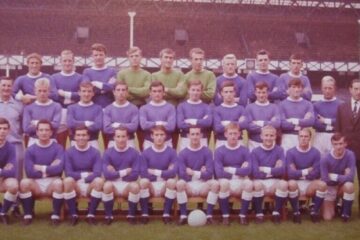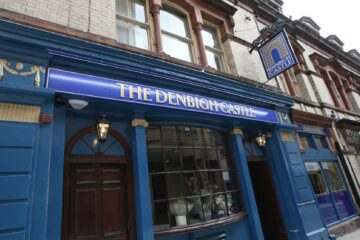8 December 1946 – 15 June 2024
Speaking to Steve Zocek in 2013, with an introduction by Rob Sawyer
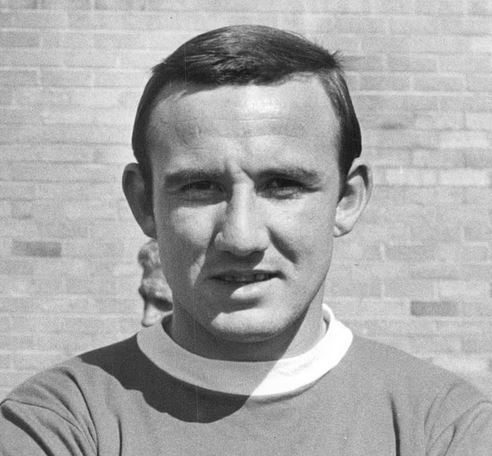
Everton FC Heritage Society members were saddened to learn of the death, at seventy-seven, of Frank D’Arcy – one of the Blues’ youth products who made it through to Harry Catterick’s highly-polished first team in the late 1960s.
The Liverpool Schoolboys player joined the Blues as a centre-half straight from school in the summer of 1962, turning professional two years later. At left-back he was an FA Youth Cup winner with the Toffees in 1965. In the quarter-final of the competition against Stoke City, Harry Catterick was watching the defender being given a torrid time by the Potters right-winger. At half-time, the boss came into the dressing room and growled: ‘D’Arcy what the xxxx are you doing? You haven’t kicked that xxxxxxx winger once.’ Frank later recalled, ‘The Stoke lad was a flyer; he used to hit the ball past you and was travelling at about 60 mph. The only way you could get at him was to foul him.’ Sure enough, Frank heeded Catterick’s advice and put the outside-right into the cinder track at the next opportunity.
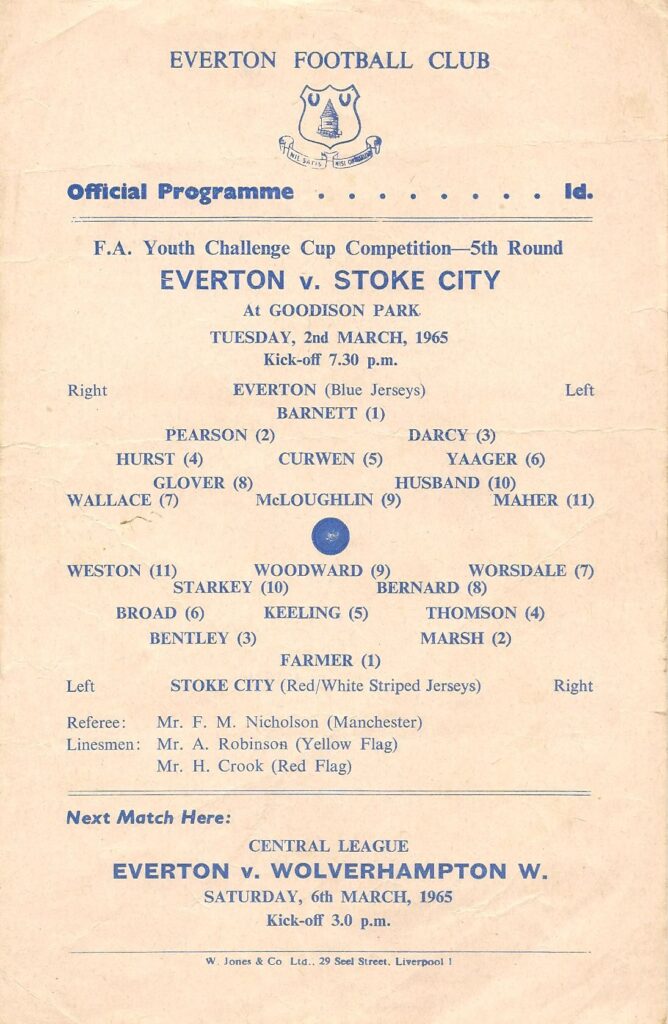
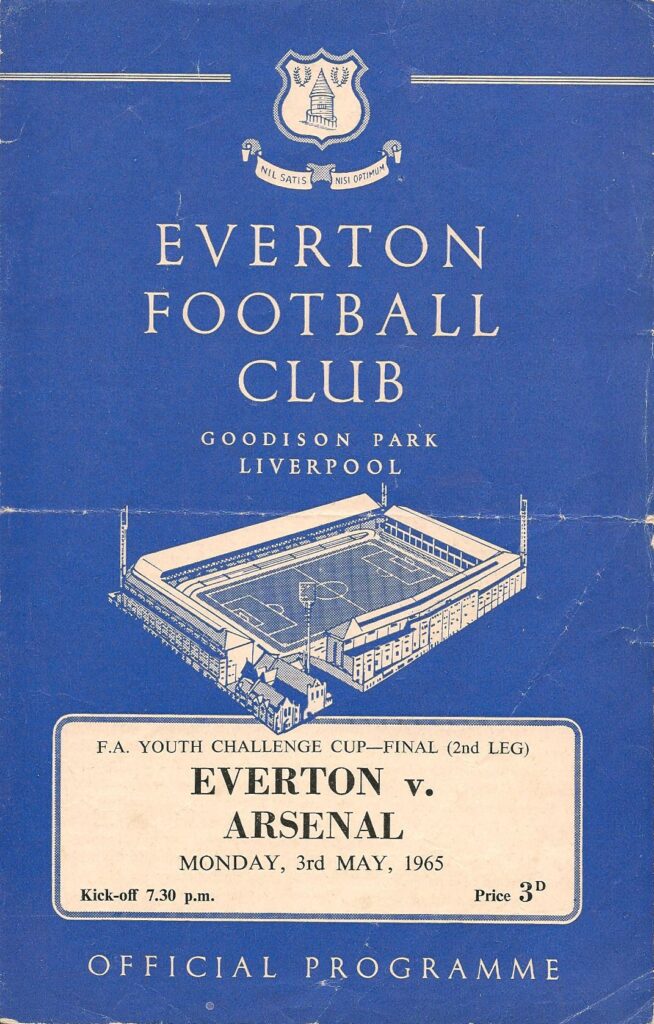
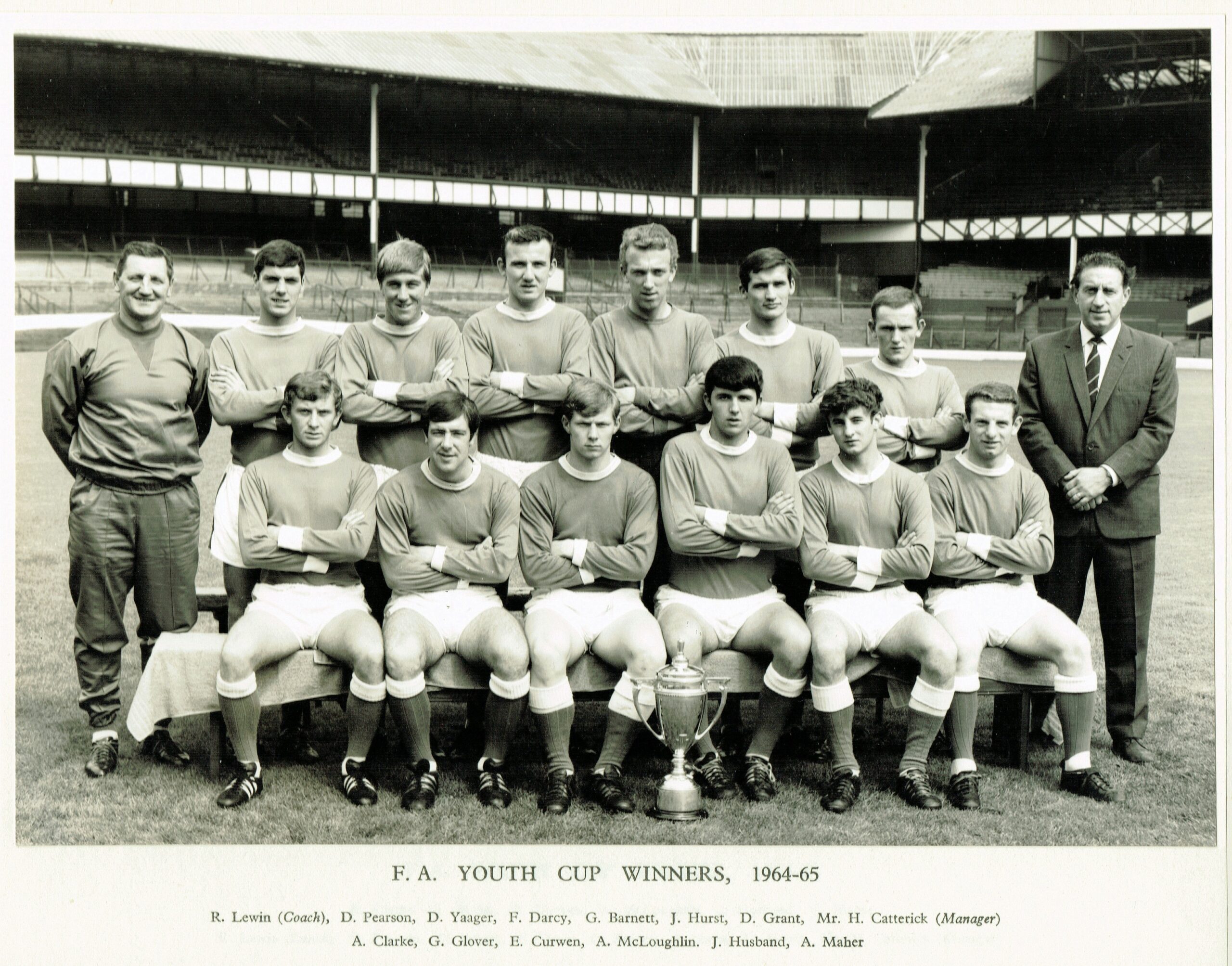
[More on the Youth Cup side by Rob Sawyer on ToffeeWeb]
The left-back made his senior debut a year after the Youth Cup success, when the club fielded a youthful side against Leeds United, a week before the FA Cup semi-final. It would be nearly 18 months before he had another appearance, also against Leeds United, at the start of the 1967/68 season, making three more at the tail-end of that campaign. With Tommy Wright, Sandy Young, Ray Wilson and Keith Newton all in the mix for selection in this era, the homegrown talent’s opportunities were limited. More often than not, this tough-tackling defender was used as a substitute, coming on to help see the games out.
Released by Everton, where he been struggling with a bad knee injury, the Liverpudlian had a brief comeback with Tranmere Rovers, making nine senior appearances in a more advanced position than he had been assigned at Goodison Park. With the knee trouble flaring up, Frank went on to assist on the coaching side at Kirkby Town and Prescot Cables.
In 2013, author and Heritage Society member Steve Zocek met Frank in his local pub and was pleasantly surprised at his excellent recall of a ten-year stay with Everton. He spoke very well of his colleagues and of Harry Catterick. A very approachable person, Frank was still regularly attending home matches at this point (two years later he was reunited with the 1965 FA Youth Cup side when guests of the Heritage Society and Everton FC).
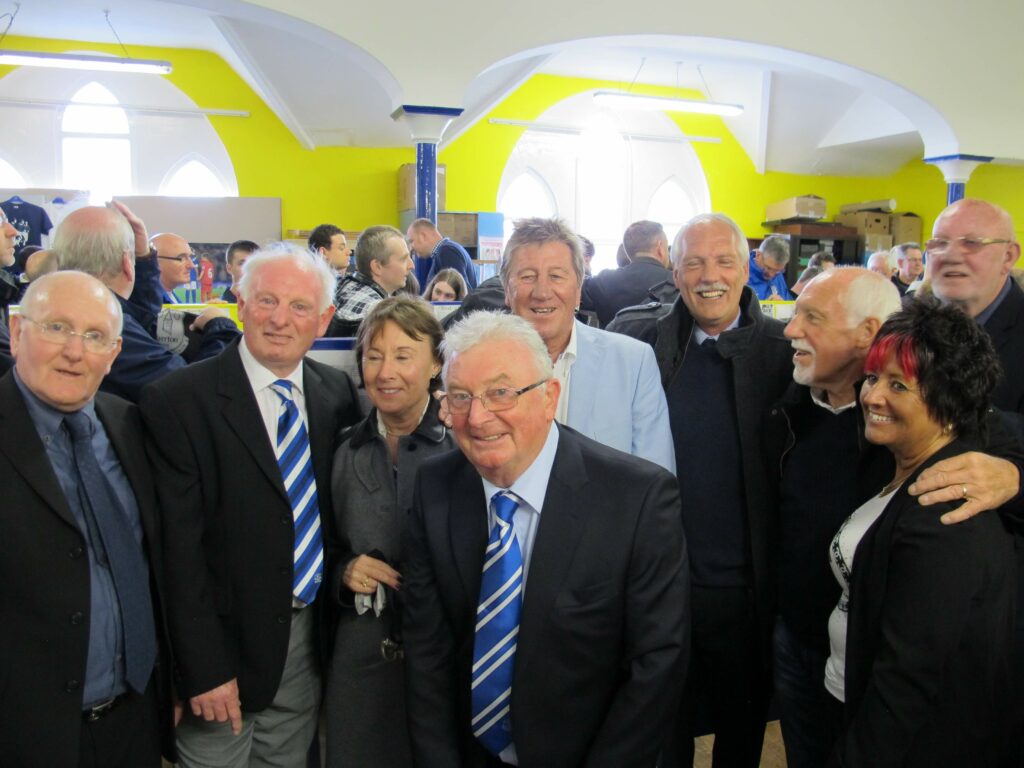

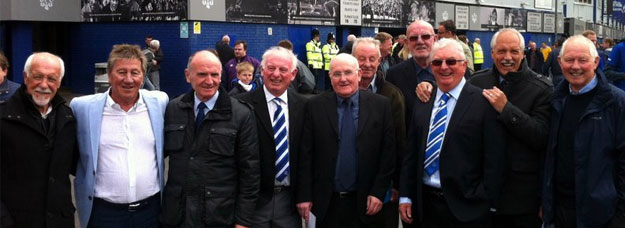
Frank was belatedly awarded a League Championship medal, for his contribution to the 1969/70 season, late last year. Club Ambassador Ian Snodin did the honours at Frank’s home, just a couple of miles from Goodison Park. He commented: ‘I was delighted when the Club told me I was due a medal. It’s been a long time coming but I’ve got it now and it means everything to me. They were great days and to have been part of an Everton squad that won the title is something I am very proud of.’

Below is the transcript of Steve Zocek’s 2013 interview with Frank (which appeared in Steve’s first book, For The Boys in the Royal Blue Jersey – the proceeds of which go to the Everton FC Former Players’ Foundation).
…………………….
HOW DID YOU JOIN EVERTON?
I signed as an apprentice at fifteen, straight from school. I was playing football in Stanley Park with my mates around 6.00pm, then I heard this shout, ‘Frank, Frank, Frank!’
It was my mother. I ran over and asked her what the matter was. She said, ‘There’s a Mr Baker in the house with his big black Rolls Royce outside. He wants to sign you for Everton.’ He was a director at Everton. I went inside, shook hands with him, and he told me he wanted to sign me, and already had the papers with him. He gave me the forms, which I signed, then I asked him if I could go out and finish playing football with my mates, to which he replied ‘Yes.’
Later, when I got back home, my mother said, ‘I have to take you to town tomorrow to get you a black blazer and a pair of grey trousers.’ He had given my mother an Everton badge to sew onto the pocket of the blazer. He also gave her an envelope containing £250, and an envelope for me with £150, which was then a lot of money. I had to report at Goodison dressed in my new attire.
YOU PLAYED FOR EVERTON IN THE FINAL OF THE FA YOUTH CUP AGAINST ARSENAL IN 1965. WHAT DO YOU REMEMBER OF IT?
I played at centre-half and marked John Radford. We lost the first-leg at Highbury 1-0. The second-leg at Goodison was a night game and watched by 39,000!
It absolutely lashed it down with rain and we were still trailing by the one goal from the first-leg with only ten minutes remaining. I’m sure it was John Hurst who got the equaliser to level the tie. The game went into extra-time, and it was either Tony McLaughlin or Aiden Maher who got the winner for Everton (Ed. Maher got the equaliser, with John Hurst scoring the winner form the spot).
YOU MADE YOUR FULL DEBUT AT LEEDS UNITED ON 16 APRIL 1966, TELL ME ABOUT IT.
I’d just signed professional forms at the age of seventeen, and don’t remember that much, but we got beaten, I’m sure of it. I found out the day before that I was playing, when Harry Catterick, who we used to call ‘Boss’, said he wanted me to take a walk with him. I was thinking, ‘What does he want me to walk with him for?’ We walked around a garden and he broke the news to me that one of the regulars was injured, and told me I had to mark the winger, whose name I can’t recall.
I made an early tackle on Billy Bremner, and very nearly chopped him in half. He growled at me with a threat that he would have me. They’re the only two things that I remember – the fact I played against Leeds, and my altercation with Bremner.
TELL ME ABOUT YOUR RELATIONSHIP WITH HARRY CATTERICK?
He was a gentleman, but has anyone told you what he did to me and Gordon West? We used to like a smoke, and before we went out to train at Bellefield, we used to share a cigarette in the toilet. Harry came down from his office, went around the back, climbed up a ladder and opened the toilet window and caught the two of us smoking! He sent us to his office and fined us £10 each. When I was fifteen years of age, the professionals George Thompson, Alex Young and Roy Vernon used to smoke in the dressing room.
One day, Harry got all the players in a room, and said he had received reports about players drinking in town during the afternoon. He said, ‘If I find out who it is, you will be fined. If you want a drink, go out of town.’ The only time we saw Harry Catterick on the training ground was a Tuesday, because the first-team used to play the reserves. He would appear in a tracksuit and wait for the first goal to go in for the first-team, then go back to his office.
I remember one of the European Cup games in Iceland, against Keflavik. I think it was Sandy Brown and Tommy Jackson who were sitting on the bench with me that night. It was freezing cold, and we only had a couple of blankets between us. The Catt threw me on for the last ten minutes. On the coach back to the airport, the driver stopped to put some diesel in the bus, and on board we had a journalist from the Echo called Michael Charters. He got off the bus to ring his report through to the paper. The Boss asked the driver what he was waiting for, to which he replied, ‘Michael Charters.’ The Boss said, ‘You’d better start driving right now! I’ve got a million pounds worth of players here so you’d better go.’ We left Michael there. I think he arrived home about three or four days later.
WHO WAS THE BEST TRAINER AMONGST THE PLAYERS IN YOUR TIME AT EVERTON?
That’s a tough one. We all worked. Colin Harvey was a very hard trainer, but we all trained hard.
HOW FRUSTRATING WAS IT FOR YOU TO BE KEPT OUT OF THE FIRST-TEAM, AND WHAT KEPT YOUR SPIRITS UP?
Money! I was there for ten years. Alex Young and Roy Vernon were there when I joined and after they went, there was the next crop that I came through with: Colin Harvey, Bally and Howard Kendall. Everton always signed good players. Keith Newton, Sandy Brown and Henry Newton were there.
One day I went to see Harry Catterick and said, ‘Boss, it’s not worth me staying because I’m only getting a game now and then.’ Catterick picked up the phone and said, ‘Is that you, Harry? Can you come in here, please?’ When Harry Cooke (the chief scout) appeared, Catterick asked him what I was on. Cooke replied ‘£25 a week with crowd bonuses.’ Catterick said, ‘Put him on an extra £10 a week. Sign here, Frank, and go and do your training.’
WHO WERE YOUR BEST FRIENDS AT THE CLUB?
Roger Kenyon, Colin Harvey, John Hurst and Joe Royle.

WHEN THE CLUB WERE CROWNED LEAGUE CHAMPIONS IN 1969/70, WHAT KIND OF SPIRIT WAS THERE AMONGST THE LADS?
Brilliant. Kendall, Harvey and Ball ran the show, if you remember. We had big Joe Royle up front and Jimmy Husband out wide. Spirits were really high amongst us all.
WHAT DO YOU REMEMBER OF EVERTON’S PARTICIPATION IN THE EUROPEAN CUP IN 1970/71?
I was involved in a lot of the trips. We saw a lot of the world, especially in pre-season trips. After we won the FA Cup in 1966, we were only back in training for a couple of days, then we went to Israel for three weeks. You were never at home!
WHAT WAS YOUR BIGGEST DISAPPOINTMENT IN YOUR SPELL AT THE CLUB?
When they got rid of me. I was playing in a reserve match at Goodison, and I got caught up in a tackle where my leg went one way and my knee the other. I went to see the physio, a guy called Norman Borrowdale, who took me to see a specialist in Rodney Street. He told me that I wouldn’t kick a ball again.
I did a bit of training, but it just wasn’t right. I was limping and I would find myself shirking out of tackles. Norman asked me what the matter was, to which I replied, ‘I’m frightened in case my knee goes again.’ At the end of the season, Harry Catterick told me he was letting me go. I went to say goodbye to everybody and walked out. I got a phone call from the manager of Tranmere Rovers, Ron Yeats. He asked me over and I managed to play eleven games before my whole knee went.
I went over to Liverpool and asked Bob Paisley if he could put me in touch with a surgeon. I got a phone call asking me to go and see him. I went along to Rodney Street with my mother to be told that I wouldn’t play football again, which was a bit of a shock. He told me my ligaments had all gone because they had been stretched, and I had cartilage damage. I was operated on in Fazakerley Hospital the following Monday.
My brother used to work for a building firm called Tyson’s, and I took a three-year course as a painter and decorator with them. I knew a director from Guinness, who asked me what I was up to. He asked me if I could drive a forklift truck. He repeated the question to be given the same negative answer. He then said, ‘You can, can’t you?’ to which I said, ‘Okay, yes.’
So, I joined Guinness and it was one of the best jobs I ever had. I still get my pension from them.
WHAT WAS THE HIGHLIGHT OF YOUR TIME AT THE CLUB?
I would say making my debut at the age of seventeen against Leeds United.
WHO WAS THE BIGGEST JOKER AT THE CLUB IN YOUR TIME THERE?
It’s got to be Gordon West. We used to have court meetings every other Monday. The one that he crucified the most was Bernie Wright.
WHO WAS THE MOST SKILFUL PLAYER AT THE CLUB IN YOUR TIME THERE?
(A long pause) If I had to choose one, it would have to be Alan Ball.
WHICH WAS YOUR FAVOURITE GROUND?
Manchester United and Newcastle.
WHO WAS YOUR TOUGHEST OPPONENT?
George Best. I couldn’t get near him. One second, he was there, then the next he was gone. The only way to stop him was to give away a foul.
WHAT IS YOUR FUNNIEST MEMORY?
When we went on a trip to Israel, we had a director called Mr Waterworth with us, who always wore a suit and tie, even in that heat. He used to come to you each day with your expenses.
Brian Labone said, ‘Shall we?’ and I replied, ‘What?’ Labby said, ‘I’ve spoken to Westie, and we’ve decided to throw him in the pool after he’s paid everyone!’
And they did it, but to be fair, he took it well.
WHAT DID RAY WILSON TEACH YOU ABOUT DEFENDING?
Ray was one of those who kept himself to himself and very rarely joined in with company. He never taught me much, to be honest.
HOW WAS YOUR TIME AT TRANMERE ROVERS?
I wasn’t there long. I had to play twelve games to get my signing-on fee of £1,000 and my leg went on my eleventh.
TELL ME ABOUT FRANK D’ARCY TODAY?
I’m now retired and awaiting a knee replacement, which the club will pay for. I had some new dentures which the Former Players’ Foundation paid for, too!
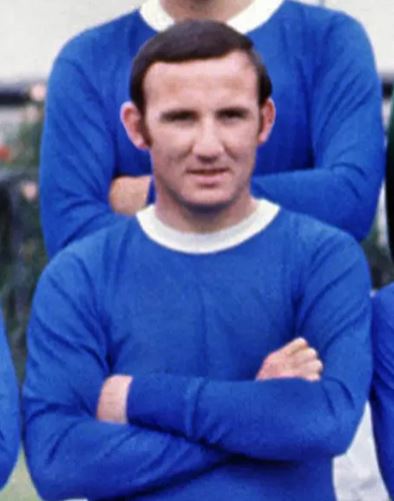
Frank D’Arcy
R.I.P.
8 December 1946 – 15 June 2024


